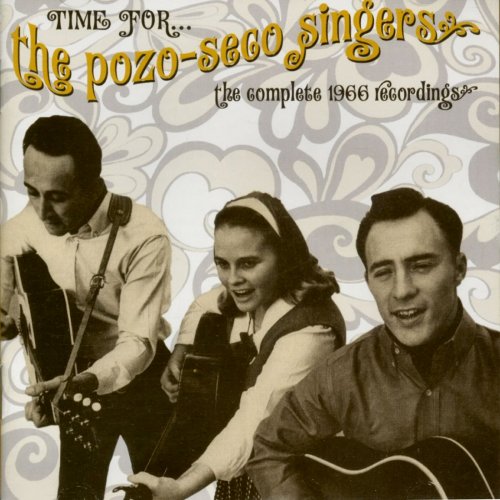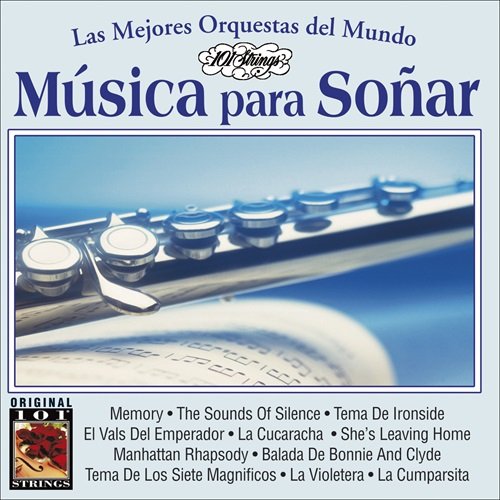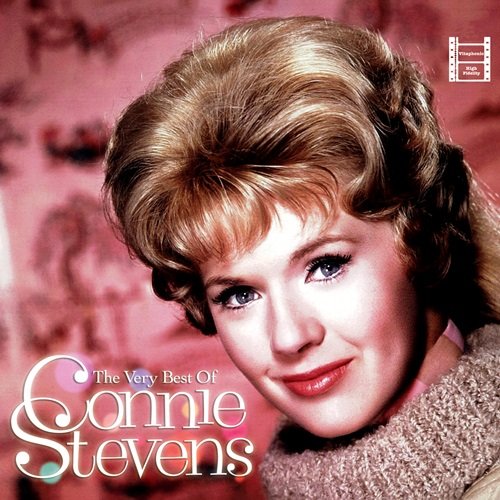The Pozo-Seco Singers - Time For...The Pozo-Seco Singers: The Complete 1966 Recordings (2009)

Artist: The Pozo-Seco Singers, Don Williams
Title: Time For...The Pozo-Seco Singers: The Complete 1966 Recordings
Year Of Release: 2009
Label: Rev-Ola
Genre: Folk, Country
Quality: Flac (tracks)/320 Kbps
Total Time: 1:00:46
Total Size: 325/143 MB
WebSite: Album Preview
Tracklist:Title: Time For...The Pozo-Seco Singers: The Complete 1966 Recordings
Year Of Release: 2009
Label: Rev-Ola
Genre: Folk, Country
Quality: Flac (tracks)/320 Kbps
Total Time: 1:00:46
Total Size: 325/143 MB
WebSite: Album Preview
1. I Can Make It With You (2:12)
2. If I Were A Carpenter (2:27)
3. Johnny (2:47)
4. Changes (2:31)
5. Forget His Name (1:50)
6. Mary Jenkins (2:05)
7. Look What You've Done (2:47)
8. Almost Persuaded (3:05)
9. Diet (1:31)
10. Ribbon Of Darkness (2:18)
11. Blue Eyes (2:36)
12. I Believed It All (2:41)
13. Louisiana Man (2:19)
14. Time (3:23)
15. It Ain't Worth The Lonely Road Back (2:13)
16. Tomorrow Is A Long Time (Album Version) (3:09)
17. If I Fell (2:50)
18. Come A Little Bit Closer (2:47)
19. Guantanamera (3:05)
20. I'll Be Gone (2:27)
21. Silver Threads And Golden Needles (2:17)
22. The House Of The Rising Sun (1:55)
23. She Understands Me (1:44)
24. You've Lost That Lovin' Feelin' (3:35)
Though little-known today, a trio from Texas was once in the thick of the ’60s folk-pop explosion. The Pozo-Seco Singers partied with Gordon Lightfoot and Odetta, toured with the Smothers Brothers and shared management with Bob Dylan and Peter, Paul and Mary. They appeared on multiple national TV programs, repeatedly explaining to puzzled hosts like Dick Clark and Mike Douglas the origins of their unusual name — it’s Spanish for "dry well."
But after a handful of albums on Columbia Records, the Pozo-Secos hit a dry well themselves. It was far from the end of the story, as seen in director Elizabeth Ahlstrom’s 2020 documentary “Nobody Famous,” which, after winning awards at the Seattle and New Jersey International film festivals, recently became available to buy or rent through Amazon, Google Play, Vudu, and YouTube TV.
Angstrom catches up with the group’s lead singer, Taylor Pie, 50 years down the road and busier than ever: running an independent record label with a high school classmate, producing and mentoring younger musicians, hosting a series of house concerts and scurrying about various folk conferences. She’s obviously having a ball, making the film’s strongest point: major-label fame is often fleeting, but when approached like any other craft, music can be fulfilling for a lifetime.
The Pozo-Secos formed at a coffeehouse at Corpus Christi’s Del Mar College, when the teenage Pie (then known as Susan Taylor), joined the older singer-songwriters Donnie Williams — the future country star known for “Tulsa Time” and “I Believe in You” — and Lofton Kline onstage at a hootenanny. The chemistry clicked, and the trio cut a demo of Michael Merchant’s “Time” at Houston’s Gold Star Studios, now SugarHill Recording Studios. The song spent a solid year on the Billboard Hot 100, peaking at No. 47.
Two others, “I Can Make It With You” and “Look What You’ve Done,” hit the Top 40. But the Pozo-Secos’ relatively brief Columbia tenure (roughly 1966-70) was also rife with missed opportunities: They passed on recording “Angel of the Morning,” a hit for Merilee Rush long before Juice Newton, because Pie found the lyrics distasteful. They also had the bad luck to record “Leavin’ on a Jet Plane” the same night as Peter, Paul and Mary; since both acts were managed by folk-pop kingpin Albert Grossman, their version never stood much of a chance. Worse, an off-color remark by Kline (who soon left the group) got the Pozos booted from a Smothers Brothers tour after one performance.
A few more songs barely grazed the charts, but the group's management and label soon moved on to hotter priorities — Janis Joplin, to name a big one — and the college gigs that were the Pozo-Secos’ bread and butter quickly dried up after the Kent State massacre. (Suddenly, folk music was seen as “too political,” Pie explains.) The spotlight exacted its toll in other ways, too: appearing on “The Mike Douglas Show,” a sort of afternoon counterpart to Johnny Carson’s “Tonight Show,” the host tells the group “with a girl that pretty, whether she sounded good or not, you would have hired her, wouldn’t you?”
But after a handful of albums on Columbia Records, the Pozo-Secos hit a dry well themselves. It was far from the end of the story, as seen in director Elizabeth Ahlstrom’s 2020 documentary “Nobody Famous,” which, after winning awards at the Seattle and New Jersey International film festivals, recently became available to buy or rent through Amazon, Google Play, Vudu, and YouTube TV.
Angstrom catches up with the group’s lead singer, Taylor Pie, 50 years down the road and busier than ever: running an independent record label with a high school classmate, producing and mentoring younger musicians, hosting a series of house concerts and scurrying about various folk conferences. She’s obviously having a ball, making the film’s strongest point: major-label fame is often fleeting, but when approached like any other craft, music can be fulfilling for a lifetime.
The Pozo-Secos formed at a coffeehouse at Corpus Christi’s Del Mar College, when the teenage Pie (then known as Susan Taylor), joined the older singer-songwriters Donnie Williams — the future country star known for “Tulsa Time” and “I Believe in You” — and Lofton Kline onstage at a hootenanny. The chemistry clicked, and the trio cut a demo of Michael Merchant’s “Time” at Houston’s Gold Star Studios, now SugarHill Recording Studios. The song spent a solid year on the Billboard Hot 100, peaking at No. 47.
Two others, “I Can Make It With You” and “Look What You’ve Done,” hit the Top 40. But the Pozo-Secos’ relatively brief Columbia tenure (roughly 1966-70) was also rife with missed opportunities: They passed on recording “Angel of the Morning,” a hit for Merilee Rush long before Juice Newton, because Pie found the lyrics distasteful. They also had the bad luck to record “Leavin’ on a Jet Plane” the same night as Peter, Paul and Mary; since both acts were managed by folk-pop kingpin Albert Grossman, their version never stood much of a chance. Worse, an off-color remark by Kline (who soon left the group) got the Pozos booted from a Smothers Brothers tour after one performance.
A few more songs barely grazed the charts, but the group's management and label soon moved on to hotter priorities — Janis Joplin, to name a big one — and the college gigs that were the Pozo-Secos’ bread and butter quickly dried up after the Kent State massacre. (Suddenly, folk music was seen as “too political,” Pie explains.) The spotlight exacted its toll in other ways, too: appearing on “The Mike Douglas Show,” a sort of afternoon counterpart to Johnny Carson’s “Tonight Show,” the host tells the group “with a girl that pretty, whether she sounded good or not, you would have hired her, wouldn’t you?”



![Jan Harbeck Quartet - Arena (2026) [Hi-Res] Jan Harbeck Quartet - Arena (2026) [Hi-Res]](https://img.israbox.com/img/2026-02/21/ta1geqbunymda1vazij2b7te7.jpg)

![Chris Forsyth's WHAT IS NOW - Both / And (2026) [Hi-Res] Chris Forsyth's WHAT IS NOW - Both / And (2026) [Hi-Res]](https://www.dibpic.com/uploads/posts/2026-02/1771839412_cover.jpg)
![Sinedades - De par en par (2026) [Hi-Res] Sinedades - De par en par (2026) [Hi-Res]](https://img.israbox.com/img/2026-02/23/k9xyrl2p7m3kmcwozolhfnu7a.jpg)

